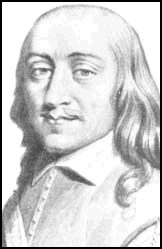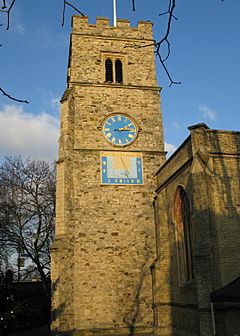Putney Debates facts for kids
The Putney Debates were important talks held by the New Model Army in England. They took place from October 28 to November 8, 1647. These discussions happened after Parliament won the First English Civil War against King Charles I. The main goal was to decide how England should be governed next.
Two main groups were involved. One group was made up of senior army officers, called "Grandees". They wanted to keep King Charles I as ruler, but with less power, creating a constitutional monarchy. This means the king would share power with Parliament. The other group was more radical, like the Levellers. They wanted bigger changes, such as "one man, one vote" (meaning most men could vote) and "freedom of conscience" (people could believe what they wanted, especially in religion).
In March 1647, Parliament, mostly made of moderate Presbyterians, worried about the army's growing power. They ordered the army to break up, but the army refused. In June, the army took King Charles I away from Parliament. By August, the army set up its base in Putney, near London. The Grandees hoped these debates would help solve disagreements with the "Agitators", who represented the ordinary soldiers. Together, these groups formed the Army Council.
The debates started at St. Mary's Church, Putney. They continued until November 8, when senior officers like Thomas Fairfax, Oliver Cromwell, and Henry Ireton ended them. They were concerned about how the debates might affect army discipline. The biggest disagreement was about who should have the right to vote. The Grandees wanted only property owners to vote. But the Leveller spokesman, Colonel Thomas Rainsborough, argued strongly against this. He famously said that even the poorest person in England has a right to live and should have a say in the government they live under.
Why the Debates Happened
The Putney Debates came about because of earlier events. In the summer of 1647, Sir Thomas Fairfax, the army's leader, along with Oliver Cromwell and Henry Ireton, tried to make a peace deal with King Charles I. This was after the First English Civil War. Their ideas were called the "Heads of Proposals". These ideas included some social justice points. However, they would have let the king and the House of Lords keep the power to reject laws from the House of Commons. Also, the king would be put back on his throne before soldiers were paid or protected by law for their actions during the war.
This compromise did not please everyone. Many soldiers and reformers, known as Levellers and radicals, felt it wasn't enough. They wanted more social changes.
Around October 1647, some cavalry regiments chose new representatives, called "New Agents." These New Agents wrote a political plan called The Case of the Armie Truly Stated. The main ideas from this plan later became part of a written constitution draft, called the Agreement of the People.
The Putney Debates started because of The Case of the Armie. Henry Ireton was very upset by it. So, the New Agents were invited to discuss their ideas with the Army's General Council.
What Was Discussed

The radical group wanted a new constitution for England. They pushed for "one man, one vote" for most men. They also wanted Parliament to meet every two years and for voting areas to be reorganized. They believed that the House of Commons should have the most power, not the King or the House of Lords. They also said that certain "native rights" were sacred for all Englishmen. These included freedom of conscience, freedom from being forced into the army, and equal treatment under the law.
Since Sir Thomas Fairfax was sick, Oliver Cromwell led the debates. Cromwell refused to agree to any plan that would remove the King. His son-in-law, Henry Ireton, argued that his own plan, The Heads of the Proposals, already covered all the concerns raised by the New Agents. The New Agents agreed to the meeting. They sent Robert Everard and another New Agent, known as 'Bedfordshire Man'. Other important army members present were Colonel Thomas Rainsborough, a successful commander, and his brother Major William Rainsborough. Also present were the Agitators Edward Sexby and William Allen. The New Agents also brought two civilian advisors, John Wildman and Maximillian Petty.
The debates began on October 28. A secretary named William Clarke and his team wrote down everything that was said. However, they stopped recording on November 2. The debates were not made public at the time. Clarke's notes were lost until 1890, when they were found at Worcester College, Oxford. They were later published as part of the Clarke Papers.
Cromwell and Ireton's main problem with the Agreement of the People was that it included terms for almost all men to vote. Ireton thought this would lead to chaos. Instead, they suggested that only people who owned land should be allowed to vote. The Agitators, however, felt they deserved voting rights because of their service in the war. Colonel Thomas Rainsborough argued:
For really I think that the poorest hee that is in England hath a life to live, as the greatest hee; and therefore truly, Sr, I think itt clear, that every Man that is to live under a Government ought first by his own Consent to put himself under that Government; and I do think that the poorest man in England is not at all bound in a strict sense to that Government that he hath not had a voice to put Himself under.
And Ireton, speaking for the Grandees, said:
no man hath a right to an interest or share in the disposing of the affairs of the kingdom... that hath not a permanent fixed interest in this kingdom.
How the Debates Ended
The debates ended with an understanding. A changed version of the Agreement of the People, approved by a committee of army officers, would be the basis for England's future government. This plan would then be shown to the whole army at a large meeting. However, the Agitators wanted to keep discussing the King's future. The Grandees worried that army discipline would completely break down. So, on November 8, they suggested that the Agitators and New Agents go back to their regiments to restore order. This stopped the meetings.
This decision was made stronger on November 11 when King Charles I escaped from Hampton Court Palace. He might have feared that the Grandees were losing control of the more radical parts of the army. The King's escape ended all debate. The New Model Army now faced a more immediate threat. On the same day, the General Council wrote a new plan for the mass meeting. It included a rule that army members had to declare their loyalty to Lord Fairfax and the General Council. This meant that any further protests would be seen as a serious offense.
The large meeting was split into three smaller ones. The regiments invited to the first meeting on November 15 agreed with the new plan. But two regiments arrived without an invitation and protested, leading to the Corkbush Field mutiny. Fairfax and Cromwell quickly stopped this mutiny. At the other two meetings, the remaining regiments agreed to the terms.
On December 7, 1647, the General Council met in Windsor. They wrote a non-political request to Parliament called the Humble Representation of the General Council of the Army. This asked Parliament to pay the soldiers what they were owed and to secure future funding for the army. A month later, on January 8, 1648, the General Council voted to close itself down.
The Putney Debates were very important. Their symbolic meaning may have been why King Charles II chose Putney Heath for a parade of 6,000 soldiers in October 1684, 36 years after the debates, following the restoration of the monarchy.
See also
- English Civil War
- Timeline of the English Civil War, 1647
- Bishopsgate mutiny, April 1649
- Banbury mutiny, May 1649
 | Aaron Henry |
 | T. R. M. Howard |
 | Jesse Jackson |


